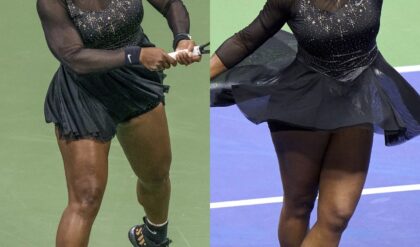The Unspoken Challenges for Black Comedians in Hollywood: A Look at Eddie Griffin, Cat Williams, and Tyler Perry
Hollywood has long been a platform for entertainment, creativity, and innovation, but for Black creators, the journey has been fraught with systemic challenges.
Comedians Eddie Griffin and Cat Williams, known for their candid humor and sharp social commentary, have often found themselves at odds with the industry.
Both have raised significant concerns about the treatment of Black talent in Hollywood, shedding light on issues ranging from stereotyping to gatekeeping and exploitation.
The Hollywood Machine and Its Double Standards
Griffin and Williams have repeatedly called out the industry’s tendency to exploit Black creators for short-term gains while failing to offer long-term support or representation.
Shows like Martin, Malcolm & Eddie, and The Jamie Foxx Show broke barriers and brought Black culture to mainstream audiences.
However, networks such as UPN, which initially championed Black programming, pivoted away from such content once it became profitable, leaving many creatives without a platform.
Griffin highlighted how the promotional efforts and accolades for Black-led productions often fall short compared to similar projects featuring white stars.
Despite the success of his show Malcolm & Eddie, Griffin noticed the lack of industry support, a pattern he says reflects a broader issue of marginalization within Hollywood.
Tyler Perry’s Controversial Role
:max_bytes(150000):strip_icc():focal(758x236:760x238)/tyler-perry-madea-homecoming-2022-103024-04d11ed560fa4ac1ab3b8cdccddbab4e.jpg)
Tyler Perry, widely celebrated as a trailblazer for Black creatives, has not escaped scrutiny.
Griffin and Williams suggest that Perry’s influence in Hollywood may perpetuate some of the very practices he is credited with challenging.
Perry’s iconic Madea character, for instance, has been criticized for reinforcing negative stereotypes about Black men.
While many view Madea as comedic and empowering, others argue that such portrayals undermine Black masculinity.
Griffin and Williams have also accused Perry of wielding his power in ways that stifle dissent.
Both comedians claim to have experienced blackballing—being excluded from opportunities—allegedly due to their outspoken nature and refusal to conform to industry norms.
The Debate Over Representation and Compromise
A recurring theme in the critiques from Griffin and Williams is the industry’s tendency to pressure Black male comedians into roles that compromise their image.
From Flip Wilson’s Geraldine in the 1970s to modern portrayals like Perry’s Madea and Martin Lawrence’s Big Momma’s House, the trope of Black men in dresses has sparked significant debate.
Both comedians view this as an attempt to dilute Black masculinity and control the narrative surrounding Black identity.
Williams, for example, turned down a role in Big Momma’s House, explaining that the decision wasn’t about the costume itself but the stereotypes it perpetuated.
Griffin has echoed similar sentiments, questioning why such roles seem disproportionately assigned to Black men while their white counterparts are not subjected to the same expectations.
The Role of Gatekeepers

Griffin and Williams argue that Hollywood’s power dynamics are upheld by a system of gatekeepers, individuals who control access to opportunities.
These gatekeepers, they say, not only decide who gets ahead but also determine who is left behind.
This system, they claim, has created an environment where Black entertainers are pitted against each other, making collective success more challenging.
Williams has gone further, alleging that even live comedy shows are manipulated by Hollywood elites.
He claims the use of audience “plants” to influence crowd reactions is a tactic to shape public perception of performers.
The Lack of Collaboration Among Black Icons
One of the most significant questions raised in this ongoing conversation is why prominent Black entertainers don’t collaborate more often.
Imagine the potential if figures like Eddie Murphy, Tyler Perry, and Will Smith joined forces. However, industry structures often promote competition over cooperation, discouraging such partnerships.
Each entertainer has carved out their niche—Perry with family-friendly films, Murphy with comedy, and Smith with blockbuster action dramas.
While these unique identities are strengths, they also make collaboration less likely, especially in an industry that tends to reward individual success over collective efforts.
Moving Forward
Griffin and Williams continue to use their platforms to speak out against the systemic challenges Black comedians face in Hollywood.
They call for greater accountability, representation, and solidarity among Black creatives.
Their message is clear: comedy should uplift and inspire, not perpetuate harmful stereotypes or silence dissenting voices.
As Hollywood grapples with its legacy of marginalization and exploitation, the voices of Griffin, Williams, and others like them serve as a reminder of the power of comedy to challenge norms, provoke thought, and drive change.






